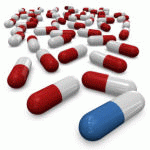Pharmacology
|
26 november 2021 13:47:28 |
| Pharmaceuticals, Vol. 14, Pages 1231: Restoring Tumour Selectivity of the Bioreductive Prodrug PR-104 by Developing an Analogue Resistant to Aerobic Metabolism by Human Aldo-Keto Reductase 1C3 (Pharmaceuticals) |
|
Tweet PR-104 is a phosphate ester pre-prodrug that is converted in vivo to its cognate alcohol, PR-104A, a latent alkylator which forms potent cytotoxins upon bioreduction. Hypoxia selectivity results from one-electron nitro reduction of PR-104A, in which cytochrome P450 oxidoreductase (POR) plays an important role. However, PR-104A also undergoes ‘off-target’ two-electron reduction by human aldo-keto reductase 1C3 (AKR1C3), resulting in activation in oxygenated tissues. AKR1C3 expression in human myeloid progenitor cells probably accounts for the dose-limiting myelotoxicity of PR-104 documented in clinical trials, resulting in human PR-104A plasma exposure levels 3.4- to 9.6-fold lower than can be achieved in murine models. Structure-based design to eliminate AKR1C3 activation thus represents a strategy for restoring the therapeutic window of this class of agent in humans. Here, we identified SN29176, a PR-104A analogue resistant to human AKR1C3 activation. SN29176 retains hypoxia selectivity in vitro with aerobic/hypoxic IC50 ratios of 9 to 145, remains a substrate for POR and triggers γH2AX induction and cell cycle arrest in a comparable manner to PR-104A. SN35141, the soluble phosphate pre-prodrug of SN29176, exhibited superior hypoxic tumour log cell kill (>4.0) to PR-104 (2.5–3.7) in vivo at doses predicted to be achievable in humans. Orthologues of human AKR1C3 from mouse, rat and dog were incapable of reducing PR-104A, thus identifying an underlying cause for the discrepancy in PR-104 tolerance in pre-clinical models versus humans. In contrast, the macaque AKR1C3 gene orthologue was able to metabolise PR-104A, indicating that this species may be suitable for evaluating the toxicokinetics of PR-104 analogues for clinical development. We confirmed that SN29176 was not a substrate for AKR1C3 orthologues across all four pre-clinical species, demonstrating that this prodrug analogue class is suitable for further development. Based on these findings, a prodrug candidate was subsequently identified for clinical trials. |
| 136 viewsCategory: Medicine, Pharmacology |
 Pharmaceuticals, Vol. 14, Pages 1229: Novel Aminoguanidine Hydrazone Analogues: From Potential Antimicrobial Agents to Potent Cholinesterase Inhibitors (Pharmaceuticals) Pharmaceuticals, Vol. 14, Pages 1229: Novel Aminoguanidine Hydrazone Analogues: From Potential Antimicrobial Agents to Potent Cholinesterase Inhibitors (Pharmaceuticals)Pharmaceuticals, Vol. 14, Pages 1232: Biostimulation of Bacteria in Liquid Culture for Identification of New Antimicrobial Compounds (Pharmaceuticals) 
|
| blog comments powered by Disqus |
MyJournals.org
The latest issues of all your favorite science journals on one page
The latest issues of all your favorite science journals on one page



